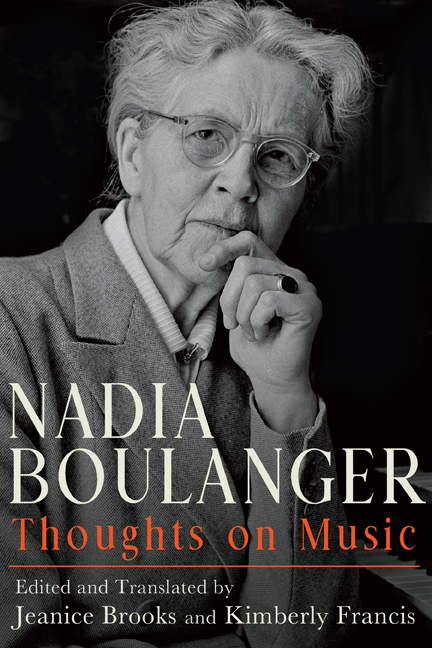Book contents
- Frontmatter
- Contents
- List of Illustrations
- Acknowledgments
- Editorial Apparatus and Critical Notes
- Note on Translations
- List of Abbreviations
- Timeline of Nadia Boulanger’s Life
- Introduction
- Part One Journalism, Criticism, Tributes
- Part Two Lectures, Classes, Broadcasts
- Bibliography of Nadia Boulanger’s Published Writing
- General Bibliography
- Index
“La visite de l’Ecole Normale de Musique,” Conferencia: Journal de l’Université des Annales 24 (Dec 1, 1933): 641-43 (complete text)
Published online by Cambridge University Press: 15 October 2020
- Frontmatter
- Contents
- List of Illustrations
- Acknowledgments
- Editorial Apparatus and Critical Notes
- Note on Translations
- List of Abbreviations
- Timeline of Nadia Boulanger’s Life
- Introduction
- Part One Journalism, Criticism, Tributes
- Part Two Lectures, Classes, Broadcasts
- Bibliography of Nadia Boulanger’s Published Writing
- General Bibliography
- Index
Summary
March 18, 1933
Short speech by Mr. Auguste Mangeot
After having welcomed everyone to the Université des Annales, the director of the Ecole Normale de Musique proceeded in the following manner:
The idea for establishing our school dates back to 1917. At the time I was in Champagne, where we were getting ready for the unfortunate offensive on the Chemin des Dames, when I thought of two friends, a young English musician and a young French girl, who had met each other in Frankfurt, where they had gone to study with Clara Schumann. It is fairly likely, I said to myself, that after the war, the French, the English, and their allies will not be so quick to go to Germany to study music anymore. Where will they go, then? If they went to Germany, it was obviously because of the ease of access and the eager welcome they were offered by the Conservatories of Berlin, Leipzig, Munich, Frankfurt, and all the other great German musical centers. In France, our famous Conservatoire admits them only in very small numbers (two per class) and under very strict conditions concerning age and talent. It would suffice, I thought, for us to create a school in Paris bringing together our greatest teachers, and that would be open, without age limits or admission restrictions, to all those who want to pursue serious music studies, paying tuition fees, for us to be able to attract to Paris many of those who used to go to Germany to complete their musical education.
I mentioned my idea to Alfred Cortot, who at this time was director of the foreign artistic propaganda service for the Ministry of Fine Arts, and made him understand that our propaganda would be equally effective and less expensive if it went from outside to inside. Sending our virtuosos or our orchestras abroad, while being very useful, seemed to me as if it must be less long-lasting than the act of steeping young foreigners in our methods, our sensibilities, our culture, our Latinate civilization, which they would then take away with them and spread throughout their countries of origin.
- Type
- Chapter
- Information
- Nadia BoulangerThoughts on Music, pp. 337 - 344Publisher: Boydell & BrewerPrint publication year: 2020



